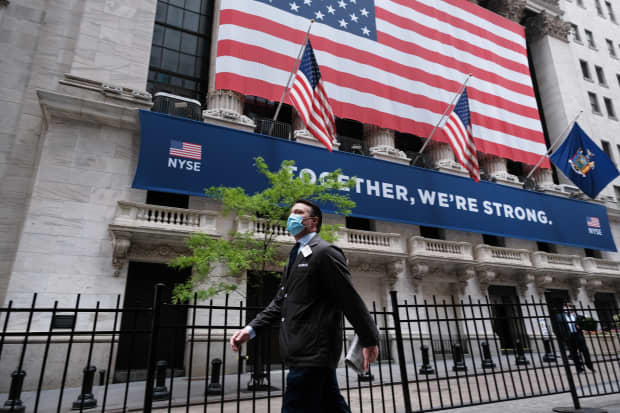This post was originally published on this site

A trader returns to work at the New York Stock Exchange (NYSE) during the Covid crisis
Spencer Platt/Getty Images
Ouch.
If you want to see how important it is to stay the course with retirement savings during this crisis — if you can — look no further than what happened last time around.
Those who took withdrawals from their individual retirement accounts or IRAs during and after the financial crisis of 2007-9 suffered long-term major long-term damage to their net wealth, according to an analysis by the Employee Benefit Research Institute, a blue-chip Washington, D.C. think-tank.
That’s not only because they spent the money, but because they also had less invested during the massive stock market rebound that followed.
(Among the many mysteries is why individuals in personal financial crisis would plunder retirement accounts such as IRAs that are legally sheltered from their creditors — especially after witnessing the 2007-9 financial crisis and its aftermath, when Main Street got fleeced and Wall Street made out like bandits.)
Analyst Zahra Ebrahimi ran the numbers on those with IRAs in their 50s and 60s during the financial crisis of 2007-9.
After 2006, as the housing, Wall Street and Main Street crises rolled around, the number of people who were not retired who withdrew money from their IRAs jumped by more than a third, from 11% of the total to 15%, she says.
And the size of the average withdrawal jumped too, from 9.6% of the balance to 11%.
What happened?
Those who withdrew money from their IRAs from 2007 through 2010 saw their average financial assets fall by about $55,000, EBRI calculates. Those who avoided withdrawing money? They were actually up $14,000, on average, by 2010.
The numbers are rough, to be sure. The surveys are done biennially, and those who made withdrawals in 2007 and 2008 won’t be exactly the same people as those who made withdrawals in 2009 and 2010, although the overlap is likely to be enormous.
And, yes, there’s a chicken and egg issue here. People suffering the worst economic devastation were more likely to make withdrawals. No surprise there.
But on the other hand bailing out can make things much, much worse. (And that’s even if you avoid the early withdrawal penalties, which often apply for those under 55.)
The S&P 500 SPX, -1.05% has risen nearly fivefold from its 2009 lows, which is another way of saying that if you withdrew $5,000 back then it’s the equivalent of withdrawing $25,000 today.
How this crisis is going to play out for retirement savings, naturally, has yet to be seen. Each time is different. The 2020 stock market crash was astonishing for its speed and brevity. The S&P 500 index is higher than it was at the start of March. And the federal government, somehow, has been able to print and send out trillions in bailout money without sparking any kind of systemic problems.
(Yet, anyway.)
On the other hand, if you think the stock and bond markets are going to produce a similar boom over the next decade that they have over the past one you are remarkably optimistic.
Valerie Radford, head of retirement retail solutions at Prudential Financial, said that the aftershocks of the last crisis are still being felt in retirement accounts today. Economic data show that those in their early 50s—early Generation X and late baby boomers — are in a far worse position regarding their retirement savings than those who are 15 or 20 years older, she says. “I think that’s likely directly attributable to the Great Recession,” she adds. “Now they have to deal with this.”

